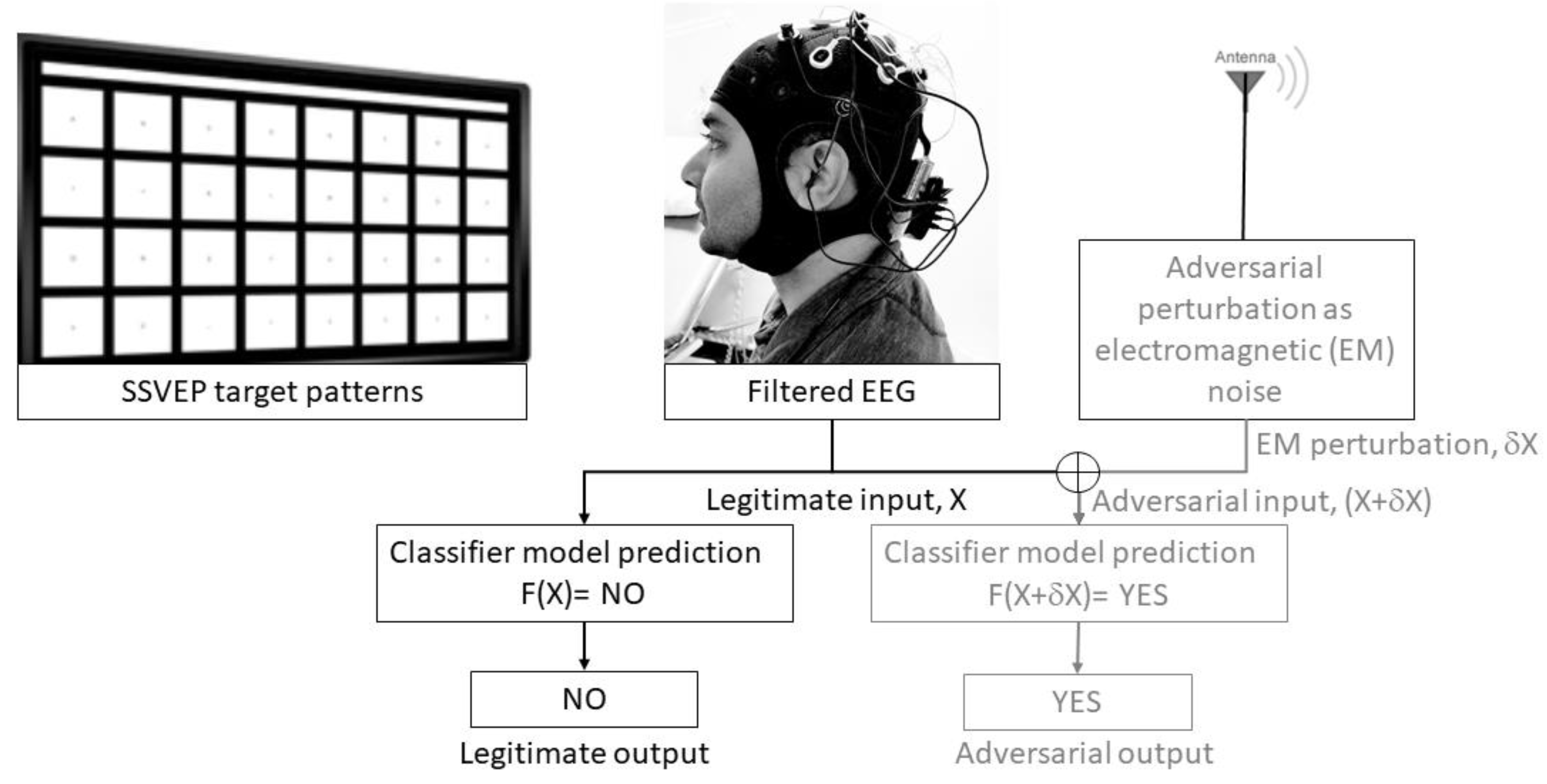Brain–Computer Interface Spellers for Communication: Why We Need to Address Their Security and Authenticity
Acknowledgments
Conflicts of Interest
References
- Rezeika, A.; Benda, M.; Stawicki, P.; Gembler, F.; Saboor, A.; Volosyak, I. Brain–Computer Interface Spellers: A Review. Brain Sci. 2018, 8, 57. [Google Scholar] [CrossRef] [PubMed]
- An, X.; Ming, N.; Sterling, D.; Qi, H.; Blankertz, B. Optimizing visual-to-auditory delay for multimodal BCI speller. In Proceedings of the 2014 36th Annual International Conference of the IEEE Engineering in Medicine and Biology Society, Institute of Electrical and Electronics Engineers (IEEE), Chicago, IL, USA, 26–30 August 2014; Volume 2014, pp. 1226–1229. [Google Scholar]
- Chen, X.; Wang, Y.; Nakanishi, M.; Gao, X.; Jung, T.-P.; Gao, S. High-speed spelling with a noninvasive brain–computer interface. Proc. Natl. Acad. Sci. USA 2015, 112, E6058–E6067. [Google Scholar] [CrossRef] [PubMed]
- Norton, J.J.S.; Lee, D.S.; Lee, J.W.; Lee, W.; Kwon, O.; Won, P.; Jung, S.-Y.; Cheng, H.; Jeong, J.-W.; Akce, A.; et al. Soft, curved electrode systems capable of integration on the auricle as a persistent brain–computer interface. Proc. Natl. Acad. Sci. USA 2015, 112, 3920–3925. [Google Scholar] [CrossRef] [PubMed]
- Moran, A.; Soriano, M.C. Improving the quality of a collective signal in a consumer EEG headset. PLoS ONE 2018, 13, e0197597. [Google Scholar] [CrossRef] [PubMed]
- Zhang, X.; Wu, D. On the Vulnerability of CNN Classifiers in EEG-Based BCIs. IEEE Trans. Neural Syst. Rehabil. Eng. 2019, 27, 814–825. [Google Scholar] [CrossRef] [PubMed]
- Rim, B.; Sung, N.-J.; Min, S.; Hong, M. Deep Learning in Physiological Signal Data: A Survey. Sensors 2020, 20, 969. [Google Scholar] [CrossRef]
- Meng, L.; Lin, C.-T.; Jung, T.-P.; Wu, D. White-Box Target Attack for EEG-Based BCI Regression Problems. In Formal Aspects of Component Software; Springer Science and Business Media LLC: Berlin, Germany, 2019; pp. 476–488. [Google Scholar]
- Qiu, S.; Liu, Q.; Zhou, S.; Wu, C. Review of Artificial Intelligence Adversarial Attack and Defense Technologies. Appl. Sci. 2019, 9, 909. [Google Scholar] [CrossRef]
- Inkawhich, N.; Wen, W.; Li, H.H.; Chen, Y. Feature Space Perturbations Yield More Transferable Adversarial Examples. In Proceedings of the 2019 IEEE/CVF Conference on Computer Vision and Pattern Recognition (CVPR), Long Beach, CA, USA, 15–21 June 2019; pp. 7059–7067. [Google Scholar] [CrossRef]
- Szegedy, C.; Zaremba, W.; Sutskever, I.; Bruna, J.; Erhan, D.; Goodfellow, I.; Fergus, R. Intriguing Properties of Neural Networks. Available online: https://arxiv.org/abs/1312.6199 (accessed on 3 January 2020).
- Wei, C.-S.; Nakanishi, M.; Chiang, K.-J.; Jung, T.-P. Exploring Human Variability in Steady-State Visual Evoked Potentials. In Proceedings of the 2018 IEEE International Conference on Systems, Man, and Cybernetics (SMC), Miyazaki, Japan, 7–10 October 2018; pp. 474–479. [Google Scholar] [CrossRef]
- Zerafa, R.; Camilleri, T.; Falzon, O.; Camilleri, K.P. To train or not to train? A survey on training of feature extraction methods for SSVEP-based BCIs. J. Neural Eng. 2018, 15, 051001. [Google Scholar] [CrossRef] [PubMed]

© 2020 by the author. Licensee MDPI, Basel, Switzerland. This article is an open access article distributed under the terms and conditions of the Creative Commons Attribution (CC BY) license (http://creativecommons.org/licenses/by/4.0/).
Share and Cite
Dutta, A. Brain–Computer Interface Spellers for Communication: Why We Need to Address Their Security and Authenticity. Brain Sci. 2020, 10, 139. https://doi.org/10.3390/brainsci10030139
Dutta A. Brain–Computer Interface Spellers for Communication: Why We Need to Address Their Security and Authenticity. Brain Sciences. 2020; 10(3):139. https://doi.org/10.3390/brainsci10030139
Chicago/Turabian StyleDutta, Anirban. 2020. "Brain–Computer Interface Spellers for Communication: Why We Need to Address Their Security and Authenticity" Brain Sciences 10, no. 3: 139. https://doi.org/10.3390/brainsci10030139
APA StyleDutta, A. (2020). Brain–Computer Interface Spellers for Communication: Why We Need to Address Their Security and Authenticity. Brain Sciences, 10(3), 139. https://doi.org/10.3390/brainsci10030139




